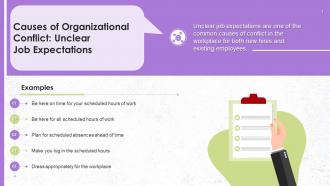Causes Of Conflict In Workplace Training Ppt
These slides, in detail, cover the common reasons for conflict in the workplace, which are unclear job expectations, goal differences, personal differences, information deficiency, poor communication, organizational changes, poor work habits, personality differences, poor supervision, and toxic work culture.
You must be logged in to download this presentation.
 Impress your
Impress your audience
Editable
of Time
PowerPoint presentation slides
Presenting Causes of Conflict in Workplace. This PPT presentation is thoroughly researched by the experts, and every slide consists of appropriate content. All slides are customizable. You can add or delete the content as per your need. Not just this, you can also make the required changes in the charts and graphs. Download this professionally designed business presentation, add your content and present it with confidence.
People who downloaded this PowerPoint presentation also viewed the following :
Content of this Powerpoint Presentation
Slide 1
This slide explains that unclear job expectations are often a major cause of concern for both new recruits and existing employees. Ultimately, people end up interpreting expectations in their own way, only to find that their manager expected something else from them. This leads to lowered morale and productivity.
Slide 2
This slide highlights goal differences as the cause of organization conflict. It explains that it is better to work on common goals to avoid team conflicts.
Slide 3
This slide explains that personal differences can cause conflict in the organization.
Slide 4
This slide depicts information deficiency as the cause of organization conflict and communication is important for the smooth running of the organization.
Slide 5
The purpose of this slide is to highlight how miscommunication can lead to conflicts in the workplace. It also includes details of areas where the dispute arises, such as collaborative efforts, closed loops, and unchecked gossip.
Instructor's Notes:
The areas where conflict arises are:
- Collaborative Efforts: When working on a team project, if a manager doesn't clearly define and communicate roles and timelines, it can lead to missed deadlines and subsequent finger-pointing and blame games
- Closed Loops: Lack of communication between departments leads to conflict. For example, employees from the sales department gave an extra discount on products to achieve their target, without communicating it to the finance department
- Unchecked Gossip: False information circulating through the office can create tension among employees, eventually leading to conflicts. Some common forms of unchecked gossip are:
- Concerns about job security
- Doubts about the company's plans/future
Slide 6
This slide showcases the importance of communication in minimizing conflict at the workplace. It explains that good communication helps avoid conflict and provides ideal conditions for improving productivity and growth.
Instructor’s Notes:
Good communication helps minimize conflict at the workplace as follows:
- Avoiding confusion
- Providing purpose
- Fostering a transparent company culture
- Creating accountability
- Enhancing productivity and growth
Slide 7
This slide lists multiple causes of poor communication at the workplace such as poor leadership, unclear objectives, limited feedback, demoralized employees, and inability to accept.
Instructor's Notes:
Different causes of poor communication at the workplace are:
Poor Leadership:
- In an organization, employees look for direction from their managers
- Good communication from top management helps motivate staff members to become more motivated and innovative
- Good leaders always communicate their objectives, goals, and future visions
- Poor communication starts when managers are unable to answer questions or clarify points
Unclear Objectives:
- In an organization, a clear understanding employees' objectives is necessary
- It requires focused, keyed-in employees who are aware about what their employee demands from them
- If the manager fails to provide directions, this could lead to confusion and frustration among employees. This is a sure-shot way to create unnecessary conflict
Limited Feedback:
- Feedback is important in any organization for better performance from staff
- Poor communication, when giving feedback, hinders staff performance
Cultural Differences:
- In an organization, diversity of culture is important as it helps businesses get new ideas for greater creativity and innovation
- Diverse cultures can lead to poor communication, as people are reluctant to change or learn what the person actually means. For instance, some communication depends on symbols, which are easily misinterpreted
- Employees working in organizations comes from different cultures and backgrounds, and their way of communication differs
- Misunderstandings turn the conversation into a conflict
Slide 8
This slide lists the consequences of poor communication at the workplace such as unpredictable work environment, less effective collaboration, workplace conflict, and low morale.
Instructor's Notes:
Consequences of poor communication are:
Workplace Conflict:
- Poor communication can cause tension between employees, making conflict an inevitability
Unpredictable Work Environment:
- Unclear communication causes issues like the labelling of a company as an unstable organization. This has repercussions on sales and customer perception
- Employees lack clear understanding of the project, lowering productivity
Less Effective Collaboration:
- Collaboration and communication go hand-in-hand
- Collaboration helps in promoting self-analysis and effective problem-solving
Low Morale:
- It becomes difficult for employees to meet expectations due to poor when the communication is poor, this results in employees feeling embarrassed even developing a low self-esteem. It is ultimately, the business which pays the price in terms of lower productivity
Slide 9
This slide depicts organizational changes as the cause of conflict. It explains that during organizational change like restructuring or merging, employees feel tension, stress, and uncertainty, which results in lower employee productivity.
Slide 10
This slide highlights poor work habits as the cause of organization conflict. It explains that there are always individuals within any organization that fail to complete allocated tasks on time. This can have a cascading effect and affects performance of many departments, leading to unsavory conflicts.
Slide 11
This slide depicts personality differences as the cause of organization conflict. It explains that people with distinct personalities work under one roof which can result in conflict.
Slide 12
This slide explains that biased supervision leads to conflict between managers and team members.
Slide 13
This highlights that toxic work culture spreads negativity at the workplace making employees unhappy, leading to fights, leave alone conflicts.
Causes Of Conflict In Workplace Training Ppt with all 29 slides:
Use our Causes Of Conflict In Workplace Training Ppt to effectively help you save your valuable time. They are readymade to fit into any presentation structure.
-
They guys always go the extra mile to meet the expectations of their customers. Almost a year has been associated with them.
-
I was mind-blown by the services that SlideTeam provided me. Thanks a ton!


































































